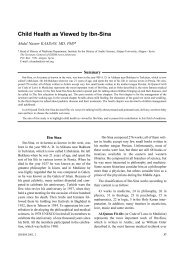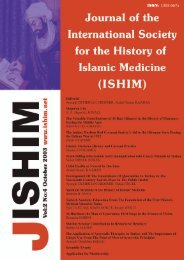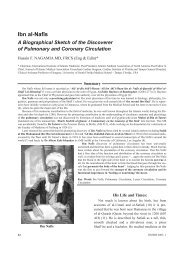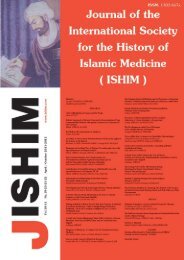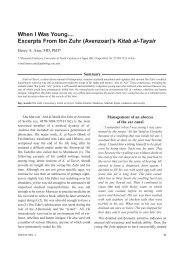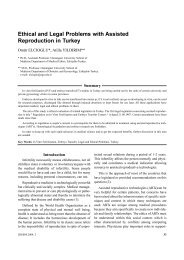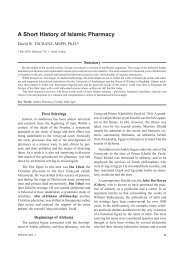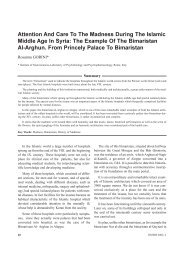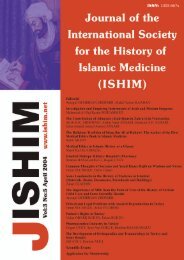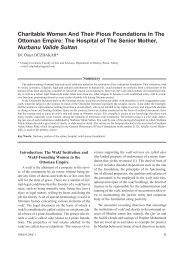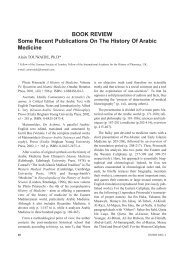The Religious Tradition of Ishaq ibn Ali al-Ruhawi - International ...
The Religious Tradition of Ishaq ibn Ali al-Ruhawi - International ...
The Religious Tradition of Ishaq ibn Ali al-Ruhawi - International ...
Create successful ePaper yourself
Turn your PDF publications into a flip-book with our unique Google optimized e-Paper software.
Sahin AKSOY<br />
but <strong>al</strong>so show how important it is to have some basic<br />
knowledge about the tradition and the belief <strong>of</strong> the<br />
writer whom you translate his book. Otherwise it is<br />
inevitable to misinterpret not only the concepts but<br />
<strong>al</strong>so the words. We intend to critic<strong>al</strong>ly an<strong>al</strong>yse the<br />
English translation <strong>of</strong> the book as well as the western<br />
literature on it, so to come to a reliable conclusion.<br />
Unfortunately, not much is known about <strong>Ishaq</strong> bin <strong>Ali</strong> <strong>al</strong>-<br />
<strong>Ruhawi</strong>. He is mentioned only in an indirect fashion in Ibn abi<br />
Usaibi’a’s biographic dictionary ‘Uyun <strong>al</strong>-Anba’. We know that<br />
he lived in Ruha at the end <strong>of</strong> 9th century. He wrote 3 books other<br />
than Adab <strong>al</strong>-Tabib. 1) A compilation <strong>of</strong> first 4 books <strong>of</strong><br />
Alexandrian Canons; 2) Introduction to Di<strong>al</strong>ectics for Beginners<br />
and 3) On Examination <strong>of</strong> Physicians (8). Literature available<br />
about <strong>al</strong>-<strong>Ruhawi</strong> in this century is very limited. <strong>The</strong>y are only<br />
Levey’s articles (9,10), Bürgel’s chapters(8,11) and Sezgin’s<br />
book on the ‘History <strong>of</strong> Arabic Literature’ (12). In fact we are<br />
thankful to <strong>al</strong>l these writers for introducing us such an important<br />
scholar and his work. Especi<strong>al</strong>ly Levey’s English translation <strong>of</strong><br />
the Adab <strong>al</strong>-Tabib was a significant contribution to medic<strong>al</strong> history<br />
literature. However with <strong>al</strong>l due respect to Levey and his<br />
work, we believe that it is a duty for us to re-examine his translation<br />
and define the points that we think he made some mistakes,<br />
intention<strong>al</strong>ly or unintention<strong>al</strong>ly, in interpreting <strong>al</strong>-<strong>Ruhawi</strong>.<br />
While Levey was introducing <strong>al</strong>-<strong>Ruhawi</strong> in his book, in the<br />
second sentence he wrote;<br />
“Al-<strong>Ruhawi</strong> was probably from Ruha, a city in<br />
Northwest Mesopotamia. It is <strong>al</strong>so known that <strong>al</strong>-<br />
<strong>Ruhawi</strong> was a Christian” (10).<br />
Although the religious affiliation <strong>of</strong> a scholar may not be relevant<br />
or important for some people, it must be imperative for<br />
Levey that he mentioned this in his very first sentences.<br />
Nevertheless it is not unique to Levey, <strong>al</strong>so Bürgel tells about <strong>al</strong>-<br />
<strong>Ruhawi</strong>’s religious affiliation in the introduction part <strong>of</strong> both <strong>of</strong><br />
his articles (8,11), and he writes <strong>al</strong>-<strong>Ruhawi</strong> was a Jewish. We do<br />
not wish to be perceived as religious take-siders but both <strong>of</strong> these<br />
information are needed to be re-ev<strong>al</strong>uated since, at least one <strong>of</strong><br />
them is wrong, if not both.<br />
None <strong>of</strong> the authors give any evidence why they think he was<br />
a Christian, or a Jewish. We do not want to assume that it was a tradition<strong>al</strong><br />
reflex <strong>of</strong> a western orient<strong>al</strong>ist medic<strong>al</strong> historian just not to<br />
give the credit <strong>of</strong> a v<strong>al</strong>uable medic<strong>al</strong> text to a Muslim scholar. We<br />
wish they live and answer this question. Since they cannot speak<br />
for themselves contemporary medic<strong>al</strong> historians like Dr. Lawrance<br />
Conrad, who <strong>al</strong>so suggests that <strong>al</strong>-<strong>Ruhawi</strong> was a Christian, may<br />
enlighten us.<br />
Anyone who reads the Arabic origin<strong>al</strong> <strong>of</strong> the book (13), or<br />
even read the English translation <strong>of</strong> it, without looking at the<br />
footnotes can easily understand that <strong>al</strong>-<strong>Ruhawi</strong> was a learned<br />
Muslim scholar. Al-<strong>Ruhawi</strong> begins his book with the words;<br />
“In the name <strong>of</strong> Allah, the Beneficent and the<br />
Compassionate in Whom I have trust and for<br />
Whose help I ask”<br />
THE RELIGIOUS TRADITION OF ISHAQ IBN ALI AL-RUHAWI:<br />
THE AUTHOR OF THE FIRST MEDICAL ETHICS BOOK IN ISLAMIC MEDICINE<br />
Every medic<strong>al</strong> historians who has some basic knowledge<br />
about history <strong>of</strong> Islamic Science knows that this is a very typic<strong>al</strong><br />
introduction for a Muslim writer. We can argue that it is not possible<br />
to find any non-Muslim writer in the history who starts his<br />
book the way <strong>al</strong>-<strong>Ruhawi</strong> starts, since this is not familiar to non-<br />
Muslim world.<br />
Al-<strong>Ruhawi</strong> use the word ‘Allah’ hundreds <strong>of</strong> time in his<br />
book, though Levey mostly prefer to translate it as God, and the<br />
other names and attributes <strong>of</strong> Allah, like Ex<strong>al</strong>ted, Beneficent,<br />
Compassionate, Life Giver, He<strong>al</strong>er, Creator, etc. As it is known<br />
that there are 99 names and attributes <strong>of</strong> Allah (Asma <strong>al</strong>-Husna)<br />
in Islamic understanding, which is not the case neither in<br />
Christianity, nor in Judaism. <strong>The</strong> frequent usage <strong>of</strong> these phrases<br />
is <strong>al</strong>so an evidence <strong>of</strong> <strong>al</strong>-<strong>Ruhawi</strong>’s religious belief. Levey, may be<br />
to strengthen his claim, tells in the very first footnote that<br />
“Use <strong>of</strong> the word Allah is not meant particularly to<br />
designate the Muslim idea <strong>of</strong> God. Further, the<br />
words Muslim, Arabic, and Islamic are gener<strong>al</strong>ly<br />
used synonymously to designate the period.”<br />
We see this as a useless effort since it is very obvious that the<br />
word Allah is meant, for an objective reader, to designate the<br />
Muslim idea <strong>of</strong> God.<br />
<strong>The</strong>re is another part <strong>of</strong> the text that leaves no doubt about the<br />
religious affiliation <strong>of</strong> <strong>al</strong>-<strong>Ruhawi</strong>. He writes in the introductory<br />
part <strong>of</strong> the first chapter that;<br />
“<strong>The</strong> first thing in which a physician must<br />
believe is that <strong>al</strong>l in this world has only one able<br />
creator who performs <strong>al</strong>l deeds wilfully.……<br />
<strong>The</strong> second article <strong>of</strong> faith in which a physician<br />
must believe is that he have credence in the great<br />
Allah with a firm affection, and is devoted to<br />
Him with <strong>al</strong>l his reason, soul, and free will.……<br />
<strong>The</strong> third faith which a physician must posses is<br />
that Allah sent His messengers to mankind to<br />
teach them what is good since the mind <strong>al</strong>one is<br />
not sufficient. Thus, without His apostles, it is not<br />
enough for man.……<br />
In <strong>al</strong>l these matters, the physician must truly<br />
believe since <strong>al</strong>l the holy books and ancients<br />
affirm them. No believer can deny them.”<br />
As it is apparent, <strong>al</strong>-<strong>Ruhawi</strong> summarizes exactly the five pillars<br />
<strong>of</strong> Islam. After this statement it is hard to understand why<br />
Levey and Bürgel suggest <strong>al</strong>-<strong>Ruhawi</strong> not to be a Muslim.<br />
Both authors use two things as an evidence to claim that <strong>al</strong>-<br />
<strong>Ruhawi</strong> was critic<strong>al</strong> to Islam. One <strong>of</strong> them is his statement on<br />
drinking wine. Norm<strong>al</strong>ly, it is assumed that a Muslim physician<br />
should not advise to drink <strong>al</strong>cohol. But <strong>al</strong>-<strong>Ruhawi</strong> writes that;<br />
“Wine is good both for the he<strong>al</strong>thy and ill. For<br />
he<strong>al</strong>thy people, it is quicker nourishment than<br />
other foods because <strong>of</strong> its quick ripening, its penetration<br />
into the liver, and its changing into….”<br />
10 JISHIM 2004, 3



